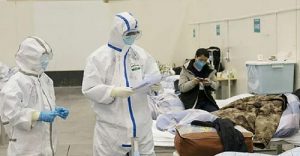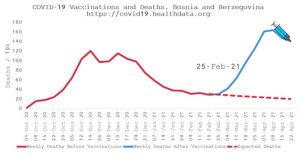
Questioning

Dr Mike Yeadon Interview

https://articles.mercola.com/sites/articles/archive/2021/05/15/planet-lockdown.aspx
2020 Australian Death Statistics
Finally the Australian death statistics are now complete and out for 2020.
Year 2016: 158,504
Year 2017: 160,909
Year 2018: 158,493
Year 2019: 169,301
Year 2020: 141,116
There were 11,948 deaths from respiratory deaths between January 1 to Dec 29 2020. The average number of deaths for the same period for 2015-2019 was 14,310.
Has the penny has dropped yet?
Say NO to Vaccine Passports
I received this email from Reignite Democracy Australia.
— URGENT URGENT URGENT — SHARE SHARE SHARE —
Hi Tom
There is no time to waste… we must act NOW!
Scott Morrison has announced this week that vaccine passports may be required to travel interstate. This means to travel within our own country!
See Channel 9 article here.
Craig Kelly and George Christensen have announced they will be introducing a Bill into Parliament to ensure this never becomes our reality.
We have built an emailing tool for you to EASILY email your local MPs and tell them what you think about Vaccine Passports.
Here are 4 simple steps how you can participate;
Start a new email.
Copy all the email addresses below and paste them into the BCC of your email so they can all be emailed in one go (this includes your Sydney MP and the Senators for your state) (If you live in a different electorate to me you will need to alter these addressees.)
Tanya.Plibersek.mp@aph.gov.au; senator.faruqi@aph.gov.au; Senator.Ayres@aph.gov.au; senator.keneally@aph.gov.au; jennifer.mcallister@aph.gov.au; senator.o’neill@aph.gov.au; senator.sheldon@aph.gov.au; andrew@andrewbragg.com; senator.fierravanti-wells@aph.gov.au; Hollie.hughes@nswliberal.org.au; senator.molan@aph.gov.au; senator.payne@aph.gov.au; senator.davey@aph.gov.au
Copy all of the sample email below into the body of your email (edit it how you like)
My name is Tom Grimshaw. I live in Sydney electorate.
I am one of your constituents so I hope my voice matters to you. Federal elections are coming up soon and as your constituent, I will be keeping a close eye on your contributions to our electorate over the coming months.
I anticipate a timely response to this email.
I only have one simple question…
When Craig Kelly and George Christensen bring the ‘No Domestic COVID Vaccine Passports Bill 2021’ to Federal Parliament soon, will you be supporting or rejecting it?
On Wednesday 19th May, Scott Morrison said in a channel 9 interview that ‘Australians could need vaccination passports to travel interstate’.
This violates at least two provisions of our Australian Constitution. Section 51 xxiia prohibits medical civil conscription and Section 117 says
“A subject of the Queen, resident in any State, shall not be subject in any other State to any disability or discrimination which would not be equally applicable to him if he were a subject of the Queen resident in such other State.” Disallowing entry to and travel within another state is a discrimination that would not apply within the resident’s own state.
I have met people who don’t want to get the COVID vaccine for legitimate reasons. Reasons like; their age-bracket is not at risk of COVID, they’ve had relatives here and overseas who’ve had terrible adverse reactions, they’re scared of blood clots, they’re very healthy and trust their immune system, religious reasons, they’re scared of needles etc.
Even if I decided to get the COVID vaccine, I wholeheartedly disagree with restricting travel of others who don’t want to get it. It should be the individual’s choice.
Scott Morrison assured us this vaccine would be VOLUNTARY. Banning freedom of movement for unvaccinated citizens seems inconsistent with that.
The freedom and future of our country depends on YOUR decision. Our fate is in YOUR hands. I hope that you do the right thing and protect our freedom of movement.
I appreciate your time in responding to my question.
Kind Regards,
Tom
4. PRESS SEND.
In addition to this, you could also visit your local Federal Member’s office. Find out who you can visit HERE.
Kind Regards,
RDA Team.
https://www.9news.com.au/national/scott-morrison-pm-says-australians-could-need-vaccine-passports-for-interstate-travel-chris-uhlmann-interview/c44ea67d-940b-4b41-9abe-7922aa0a0d75
COVID second wave killing doctors despite getting the jab; raises concerns in India

(Tom: Despite being vaccinated, 269 doctors have died from COVID.
People! Stick to the narrative!
They did not die from the vaccine, they died from “the second wave”. )
As the second wave of COVID-19 wreaks havoc in India, at least 269 doctors have died as per the Indian Medical Association (IMA). According to IMA President JA Jayalal, the majority of these doctors have received at least one dosage of the vaccination. Covid-19 claimed the lives of 756 physicians last year.
https://www.ibtimes.co.in/covid-second-wave-killing-doctors-despite-getting-jab-raises-concerns-india-details-836495
Nobel Laureate Luc Montagnier Speaks Out
Mass Vaccination – A scientific error as well as a medical error. The variants to the original vaccine are being created in response to the vaccine, not in the wild. The more you vaccinate, the stronger the virus, the more people who will die.
https://www.bitchute.com/video/oWSszDrvItoH/
Why You Cannot Get The Full Picture From The Media

Doctor’s message about low pediatric deaths from COVID blocked by Facebook: “A Facebook user asked about the number of COVID-19 pediatric deaths in the month of April. Dr. Tracy Høeg, a sports, spine, and regenerative medicine doctor, responded with factual information from the CDC and American Academy of Pediatrics (AAP), and even included a graph.” https://reclaimthenet.org/dr-tracy-hoeg-censored/
Senior Scientist on COVID Vaccines: ‘Insanely Reckless’

STORY AT-A-GLANCE
The typical unprecedented vaccine takes 12 years to develop, and of all the unprecedented vaccines in development, only 2% are projected to ever make it through all Phase 2 and 3 clinical phases of testing
The COVID-19 vaccine was developed with Operation Warp Speed in less than one year, which makes it virtually impossible to assess safety and efficacy, as the vaccine has not been adequately tested
Five months into the vaccination campaign, statistics tell a frightening story. Research shows deaths are 15 times higher during the first 14 days after the first COVID injection among people over the age of 60, compared to those who aren’t vaccinated
Another study shows that after COVID-19 vaccines were implemented, overall death rates have increased, with the exception of a few areas. It appears countries in which COVID-19 vaccines have not raised mortality rates are also not using glyphosate
In the next 10 to 15 years, we are likely to see spikes in prion diseases, autoimmune diseases, neurodegenerative diseases at younger ages, and blood disorders such as blood clots, hemorrhaging, stroke and heart failure
https://articles.mercola.com/sites/articles/archive/2021/05/23/stephanie-seneff-covid-vaccine.aspx
Hegelian Dialect

